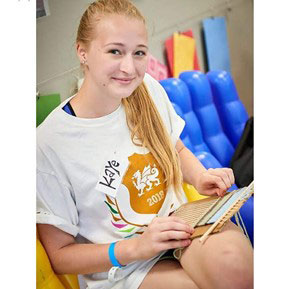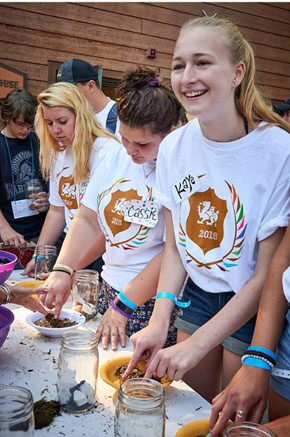Session Information
Date: Saturday, November 12, 2022
Title: Patient Perspectives
Session Type: Patient Perspectives
Session Time: 5:00PM-6:00PM
Background/Purpose: I was diagnosed with Juvenile Idiopathic Arthritis at the age of ten. The constant battle between doctor appointments, pain, and medication side effects left me feeling discouraged and alone. My doctor recommended arthritis camp a few times during my appointments, but I could not imagine a fully accessible camp filled with kids like me. In high school, I finally decided to give camp a try.
Intervention: An Arthritis Foundation camp in Minnesota turned out to be one of the best things to happen to me. This camp has hosted up to 130 kids for a week each summer since its start in 2014. During my three years of attendance I was able to meet both kids and adults with arthritis. This gave me a chance to talk about my own arthritis-related frustrations and helped me see hope for the future in the counselors who were living full and successful lives.
Maintenance: One of the most impactful parts of camp was the advocacy and education sessions that were led each day. These sessions, known to campers as Seeds, planted small seeds of knowledge in campers regarding advocacy, how to keep our bodies and minds healthy, and coping strategies for pain. We created skits about advocating for yourself, learned about low-impact exercise, and were introduced to mindfulness. I did not recognize it at the time, but Seeds and the discussions I had with my peers led to my passion for advocacy and teaching others about it. I was able to recognize the power of my voice as a patient and learned how to effectively use it. After attending camp, I became comfortable speaking up for myself at doctor appointments and was able to have a thorough discussion with my doctor about the debilitating fatigue and nausea that one of my medications was causing. The doctor was hesitant about changing my dose, but my ability to clearly present the situation and the negative effects the meds were having helped them realize the necessity of a medication change.
Quality of Life: I now find myself in a number of advocacy roles, including being a peer-mentor for the Disability Resource Center on my college campus and being a patient research partner as part of the Young Patients’ Autoimmune Research and Empowerment Alliance (YP AREA). I still experience pain from my arthritis and some side-effects from my medications, but to a lesser degree than in the past. All of the advocacy skills and discussions about healthcare transition that were started at camp were put to the test as I transitioned from pediatric to adult healthcare. These skills allowed me to speak up for myself and become more engaged in my own healthcare. I am looking forward to going back to camp as a member of the program staff to help plant these same seeds of knowledge in kids and teens with arthritis.
To cite this abstract in AMA style:
Anderson K, Carandang K, Wells C. Planting Seeds of Self-Advocacy: Increasing Healthcare Engagement in Children and Adolescents Through Arthritis Camp [abstract]. Arthritis Rheumatol. 2022; 74 (suppl 9). https://acrabstracts.org/abstract/planting-seeds-of-self-advocacy-increasing-healthcare-engagement-in-children-and-adolescents-through-arthritis-camp/. Accessed .« Back to ACR Convergence 2022
ACR Meeting Abstracts - https://acrabstracts.org/abstract/planting-seeds-of-self-advocacy-increasing-healthcare-engagement-in-children-and-adolescents-through-arthritis-camp/


